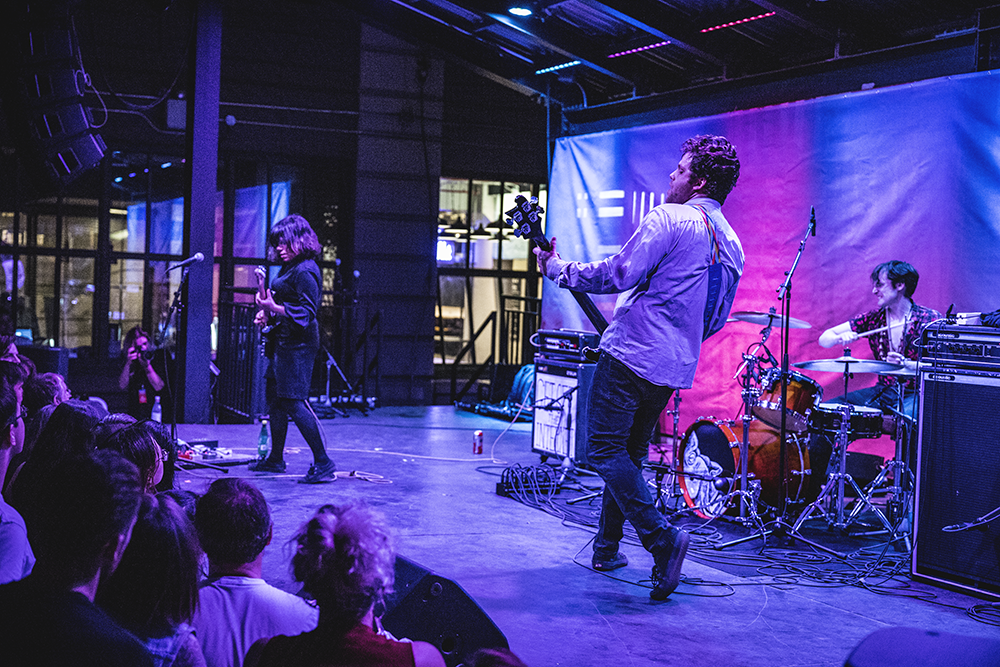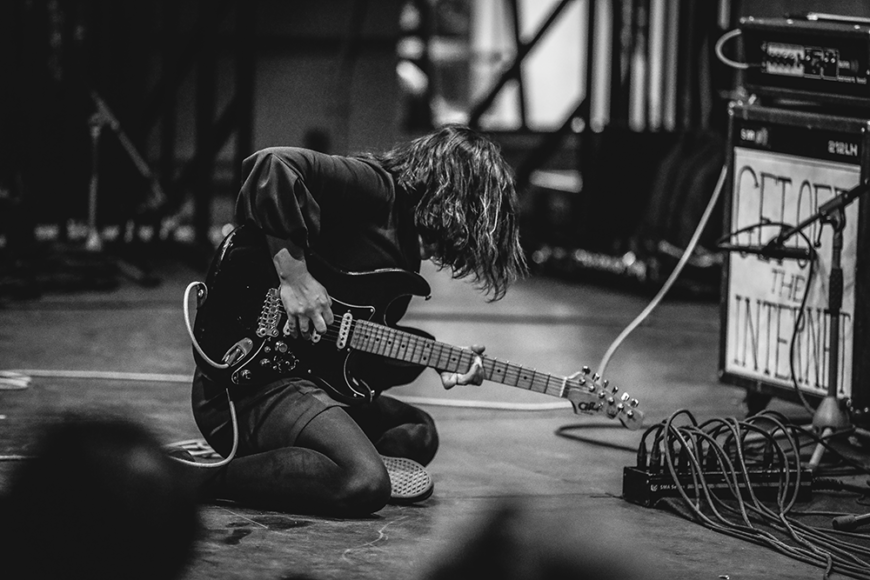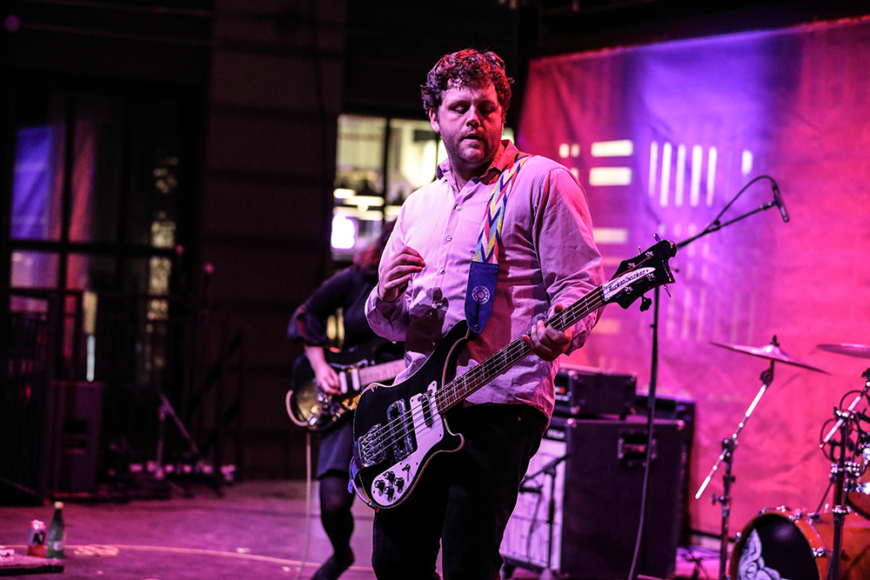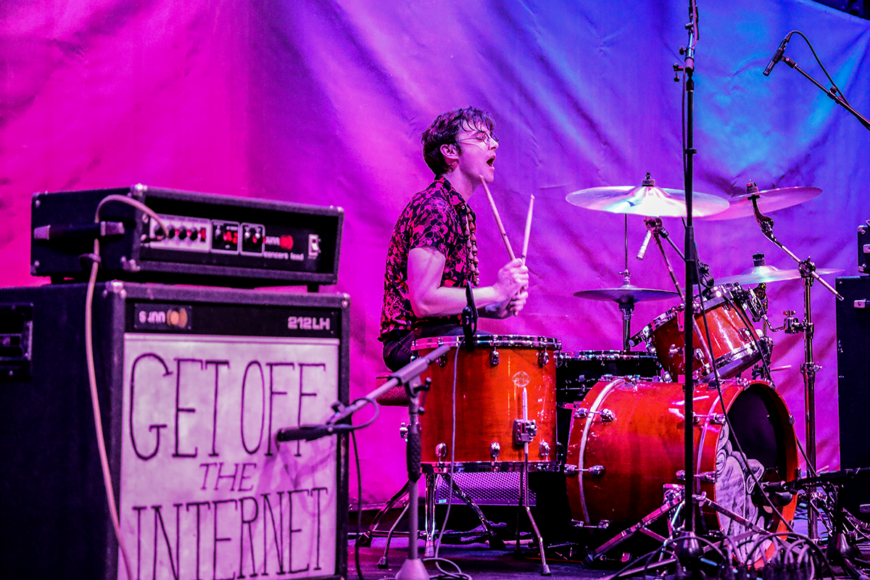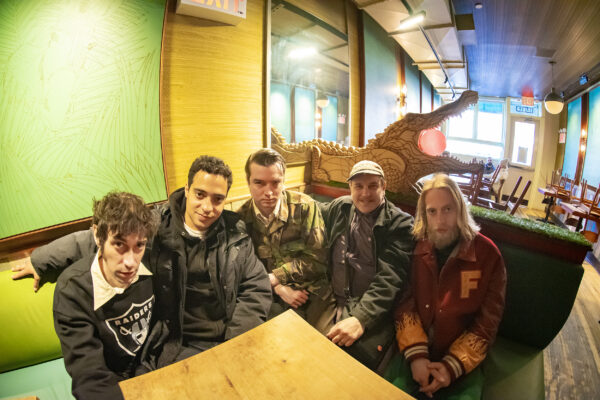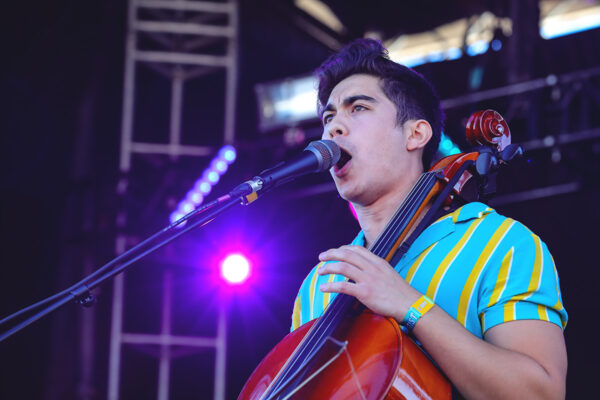“Just go ahead,” said Marissa Paternoster, very quietly and politely. She laughed and nodded at the in-progress drawing she had placed on her lap. Her expression seemed to promise, I’m not disinterested; I’m just going to work on this simultaneously. It was an intricate marker-on-cardboard piece with swirls and abstract patterns that continued to grow as we spoke. She made leafy, vine-like strokes with black pen, staring down at the shapes intently. Then she would shift her attention back to the group with little jolts of interest for certain questions and topics. In one of those cool moments that comes with observing a ravenous rock band outside of their natural habitat, it was pretty surreal to see Screaming Females chilling on couches without instruments in their hands.
The three seasoned rockers had just eased into their not-so-backstage area, a silent and pristine room way upstairs in Brooklyn’s giant Industry City space, overlooking the outdoor stage they would later tear to pieces. The influence of different venues on their sound was actually the first thing that came up in our conversation – one that was brimming with down-to-earth inspiration and contemplative analysis of their own musical process. “I think that our live sound has evolved in an interesting way,” said bassist King Mike Abbate, “because when we were playing basements all the time, we used to play so many notes. Just all kinds of notes. We were just riffing nonstop. And I feel like once we started playing clubs more, with bigger sound systems and the sounds bouncing around a little bit more, it became riskier to play all that much. So for me, it’s become more about vibes and less about riffs. Filling space with fewer notes.”
On the topic of composition, Screaming Females reflected on their process over the years, having released seven studio albums since 2006. Paternoster noted, “That’s pretty much stayed the same. In terms of writing songs, we just write them at band practice. We practice once a week. And someone just brings in an idea, and then we’ll work on it for a while until it turns into a song, hopefully. Sometimes it turns into nothing. But usually it turns into a song – even if it’s like, a bad one,” she flashed a genuine smile and refocused on her artwork. Abbate said, “There are a few songs that Marissa will just have written, and she’ll come in and show us how to play it. And we’ll make little tweaks. Jarrett did a whole arrangement on a synthesizer that turned into one of the songs on All At Once. Sometimes we’ll come in with songs. Other times, it’s just jamming.”
Drummer Jarrett Dougherty recalled, “I heard this lady play recently – I forget her name – but she had an acoustic guitar singer-songwriter setup. And this one song had a really cool rhythmical part in it, the way she was playing guitar. I was sitting there and I was just like, ‘What is this?’ It was going like, 1-2-3, 1-2-3, 1-2. 1-2-3, 1-2-3, 1-2. And I was like, ‘Oh! We’ve gotta go 1-2-3, 1-2-3, 1-2 at some point. So now we’ve written like a really riffing, heavy-ass song that’s based on being at a singer-songwriter’s show. That is brand new; never done that before. So the genesis of a song can kind of come from anywhere. But more often than not, Marissa has an idea, brings it in, and it’s not like a complete song, but we just start working on it and create a cool song together. But it can come from all of these other sources as well. Usually, it starts with an idea that one of us brings in, these days.” “We don’t know how to answer a lot of your questions, because we’re going senile,” laughed Paternoster. “I really can’t remember anything anymore. Thank god for the voice memo function on an iPhone or I else I would never remember any of my ideas.”
Screaming Females then determined which song had required the most time and effort back when they’d pieced it together. Abbate said, “There’s this song on All at Once called ‘Deeply’ that started as a demo that I made…” “And we ruined it,” Paternoster interjected. Abbate said with a laugh, “It was like a pop-punk song, and then there were four or five different versions of it. We joked about releasing an EP of every version of ‘Deeply.’” “The Deeply EP,” Dougherty said coolly. “But we’re not going to do that,” stated Abbate. “Yeah I don’t want anyone to hear that one,” Paternoster snickered. “I like ruined that song, at a point.” Sounding amused, Abbate added, “There was a version that came dangerously close to being on the album, but Matt [Bayles], who engineered it, called it ‘the SportsCenter riff,’ and Marissa was deeply offended by that.” “And the other side of that is ‘Glass House,’” Dougherty shared. “That one we wrote in like ten or fifteen minutes.”
Anticipating all the raw power the pure-rock trio delivers in the live setting, our conversation landed there next. Paternoster even revealed the thoughts going through her head when she’s performing. “Usually, I’m like, ‘Oh my god, I hope I don’t mess this up.’ That’s like 99.9% of it. I’m worried all the time,” she said lightheartedly. Dougherty shared his differing perspective from behind the set. “I’m usually only worried for like the first song and a half, and if I get past that point, then the show’s going really well, and I’m not thinking about anything. It’s like a complete void. Nothing’s really going on in the brain – I’m just kind of going with it. But, if I mess up in the first song, then I’m thinking about every little moment for the rest of the set,” he snickered. Mike agreed, “I’ll spend the entire rest of the set saying, ‘You suck. You don’t deserve to be here. The fuck is wrong with you?’” “We’re unified in our strength for hating ourselves,” laughed Paternoster. “It’s a beautiful thing. And then the three of our powers combine.”
Paternoster analyzed her own songwriting habits. “I’m not often struck by this feeling of being inspired. I mean sure, that happens, but it doesn’t happen to me that much,” she paused thoughtfully, then let out another quick laugh. “I just like making music because it’s satisfying. It doesn’t really come from a place of inspiration. So I think it’s just a lot of hard work sometimes, for the three of us to figure out how to put together a song. There are moments where it kind of all comes together really easily, but that doesn’t happen as often as working really hard on a song happens. We’ve definitely been lucky to have a handful of songs just come together without having to talk about it that much. But most of them we spend like weeks and weeks on, and then demo, and then spend more time on. I like that aspect of it, you know? We’ll usually just compose a song first, and then I’ll go home and start writing lyrics for it, and those will change probably up until we actually make plans to make a record. So if I bring in a song that’s almost written, that might have come from a lyric. Sometimes I write some lyric ideas down, and then I make drawings and stuff. I don’t know, it comes in all kinds of different ways. There’s no one way to make something…there’s no one right way to make something,” Paternoster mused.
“We’ve got a batch of new songs that we’re slowly putting together,” revealed Abbate. “Are we excited about it? I don’t know.” “Yeah!” said Dougherty. “I’m excited about it.” The drummer then assessed his own sources for ideas. “I feel like more than inspiration, I try to put things in my back pocket. I hear something like what I was saying earlier – that woman I heard play that rhythm on guitar – I was like, ‘That’s a cool rhythm. Remember it! Remember it! Remember it! It’s almost this thing where I’m like, ‘Don’t…forget…that.’ I walk out of the space and I’ll zone out because I’m like, ‘332-332! Remember that!’ And it’s just like those little pieces that you pick up. Or I’ll hear somebody do a drum fill, or I‘ll hear a moment in a song where there’s a call-and response thing between a guitar and a vocal, and I’ll be like, ‘Oh that’s a cool thing! I don’t know if we’ve ever done that before.’ We always identify this when we’re driving in the van listening to songs, or watching other bands play. We’ll be like, ‘Oh we’ve never done that thing before.’ I remember one moment – there’s like a classic thing where if you have a pre-chorus to the song, you do like the verse, the pre-chorus, and then you go back to the verse, then pre-chorus. Then you hit the chorus the second time through. And we’d never had a pre-chorus for a long time,” Dougherty said amusedly. “So we wrote a song and it had a pre-chorus, and I was like ‘We’ve gotta do the fake-out pre-chorus thing!’ So it’s less like inspiration and more like paying attention to all of these different things happening around you. And trying to remember them and put them away so that when we do have that moment when we’re just jamming and working on something, we’re like, ‘Oh, why don’t we work in one of these moments that I put away in my back pocket over the last year?’”
If you ask Screaming Females to describe their own sound, prepare for some funny sarcastic responses. “It’s like the Jonas Brothers,” deadpanned Abbate. “Yeah, the Jonas Brothers make like the heaviest music on the radio right now,” said Paternoster. Dougherty said, “I usually say ‘rock music,’ and people are like, ‘Ohh–kay, well come on,’ and I’m like, ‘No, it actually is just like…rock music.’” “Like...bar rock,” suggested Abbate, prompting hearty laughter from Dougherty. “It’s like a little blues…it’s like the weekly blues jam.” “I would put us on TouchTunes if I went to the bar,” Paternoster commented. “You know, those digital jukeboxes if you’re in a scary bar.” She also responded with humor to any acknowledgements of their reach or success. “That’s weird. The other day that border patrol guy told us he’d never heard of us,” she quipped at one point with a shrug. “I was like, ‘That makes sense! You’re a cop!’”
Unsurprisingly if you’ve seen them live, Dougherty confirmed they “definitely” change things up in the moment when they’re rocking out. “Sometimes it goes bad. It depends. I feel like for me, personally, it’s just the vibe of the set. We always have moments in songs that are open-ended so that we can change them, and sometimes we’ll fall into patterns where we just start doing a similar thing every time we play it. And that can be reassuring, and that can end up being very good, because we’ve practiced it, but…” “You’ve gotta throw a wrench in it every once in a while,” said Abbate. “Yeah!” agreed Dougherty. “Every once in a while you’re like, ‘Nah, I can’t let ‘em expect too much.’” The guys then confirmed that they’re most often the ones throwing the wrenches. “We’ll be sitting there playing for a while and be like, ‘I hope Marissa gets loud…right…now!’ and hopefully it works out,” explained Dougherty. Paternoster chimed in, “I feel like the rhythm section’s in charge of that kind of stuff. I can only get so loud. I can never be louder than the drums.” Dougherty said admiringly, “But then sometimes, we’ll go into a section and you’ll just play a different solo in that moment of the song…” “I always play a different solo,” Paternoster cut in with a grin. “I don’t know what I’m doing.” “But totally phrased differently,” he insisted. “Like a different thing, and I’ll just be like, ‘Whoa! Where did that one come from?’ That’s so sick!”
“I personally find ego to be kind of disgusting, when I come into contact with someone who has one that’s out of control,” Paternoster shared. “So I just try to not be like that. I don’t like hanging out with people like that,” she laughed, “and I don’t have any choice but to hang out with myself.” “We all have enough self-criticism going on that any sort of praise kind of comes through as like ‘Huh! That’s funny.’” said Dougherty. Paternoster added, “We’re very, very lucky to be able to play music for people, and regularly go on tour and see the world, and make lots of new friends, and have unique experiences through playing music and being in our band. I never thought I’d get to do all of this stuff, and I’ve been doing it for a while now, so every time I get to play, I’m very grateful to be there.”
Since their Brooklyn show that night happened to fall on the last day of World Pride Week and the 50th anniversary of the Stonewall riots, to the day, we discussed that subject briefly. “I’m happy for anybody who gets to celebrate their identity in whatever way that they choose,” said Paternoster. “The whole culture that surrounds pride and how brands have co-opted LGBTQ culture to sell shit makes me feel like I’m covered in slime, and it’s not really my bag,” she explained. “But I’m totally happy and down for people getting out in the street and being able to feel comfortable in their own skin. If you have to drink out of a Coors Light rainbow-flag beer koozie to do that, it’s totally cool. It’s just not my thing.”
Before we left them to figure out their setlist (a task managed by Paternoster) and prepare for the show, Screaming Females shared sound advice for anyone out there interested in pursuing music. “My advice would be: do it for yourself,” said Abbate. “Don’t think that you’re gonna make it or anything. Because anyone that’s going and starting a band for that reason probably makes shitty music.” Paternoster urged, “If you really wanna play in a band, you’re just gonna do it, and it really doesn’t matter what else is going on. Just do it. Don’t do it for other people.”
Article: Olivia Isenhart
Photos: Shayne Hanley

